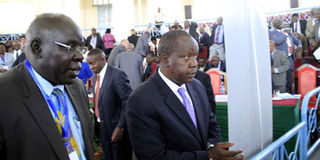To grow, we must nurture our human capital

Prof David Some (left), the commission secretary and chief executive officer of the Commission for University Education, with Fred Matian'gi, the Cabinet Secretary for Education, Science and Technology, at Kenyatta University in Nairobi on August 22, 2016. PHOTO | DIANA NGILA | NATION MEDIA GROUP
What you need to know:
Streamed admission is achievable if the Commission of University Education insisted that each university register its niche, for example ICT, humanities, engineering, and directed enrolment according to the faculty and facilities available.
- It takes all key interested parties to walk the talk by striving to meet the minimum international university benchmarks in order to improve quality and graduate employability.
Universities are industries of knowledge where intellectual capital is grown as an asset. It is known that knowledge economy has driven development, especially in the newly industrialised countries (NIC), the so-called Asian tigers.
These states have prospered by moving from the past, where an abundant labour force and exploitation of natural resources were the engines of growth. Now companies mine data, not gold seams, in search of riches. They harvest mobile applications rather than apples and use information as the main source of wealth. For Africa to prosper, it must learn to capitalise on its human capital.
Kenya had about 70 universities with an enrolment of over 500,000 students in 2015. However, we need to ask where these students will go after graduation and whether they are employable.
The first question calls for careful planning of training personnel to satisfy national demand. This can be easily achieved if the national and county governments, the Federation of Kenya Employers, and non-governmental organisations filed their requirements through the Kenya National Bureau of Statistics and if university admissions were in line with these statistics to drive the niche of each university instead of the current trend of mass admission to programmes duplicated in most universities.
REGISTER NICHE
Streamed admission is achievable if the Commission for University Education insisted that each university register its niche, for example ICT, humanities, engineering, and directed enrolment according to the faculty and facilities available.
The question of employability gives the challenge to institutions and employers to support the quality of student knowledge, skills, attributes, reflective disposition, and identity that graduates need to succeed in the workforce. Many countries are paying attention to this.
Kenya’s industry has questioned the quality of education. Critics cite lack of communication and hard skills among university graduates. In areas such as STEM (science, technology, engineering, and mathematics), ICT, and engineering-related programmes, which are crucial to national development, basic facilities such as well laid out lecture theatres, laboratories and associated equipment, and qualified lecturers are lacking.
The numbers admitted are large and the mix of vocational education with university studies has made the situation worse as graduates from both streams end up with more theory at the expense of practical skills. The latter is diminished by competition for the few spaces available in industry.
POSTGRADUATE STUDENTS
Universities derive knowledge from research conducted by postgraduate students, especially at PhD level. With 5,604 lecturers holding PhDs against the enrolment of 539,749 students, there is clearly an overload on the lecturers, who therefore pay attention to undergraduate rather than graduate programmes. There is, therefore, a need to build incentives for lecturers to supervise postgraduate programmes.
Kenya is still sending people abroad to train in areas where there is lack of facilities at home. For those going on such overseas scholarships, official bonds and attractive packages in academia would enable postgraduates and those in the diaspora to come back.
It takes all stakeholders—the government, industries that consume graduate labour, individual university councils, management, and dedicated faculty in senates—to walk the talk by striving to meet the minimum international university benchmarks in order to improve quality and graduate employability.
We need to change our mindsets and continue improving in order to grow badly needed human capital in all sectors of our economy.
Robert Akello is a lecturer of electronics and telecommunications engineering at Multimedia University of Kenya; [email protected].




